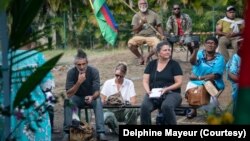When riots broke out in the French territory of New Caledonia last month, journalist Coralie Cochin started rising before the sun.
For about a week, it was too dangerous for Cochin to leave her neighborhood in the suburbs of the capital, Noumea, so she would drive nearby streets looking out for developments.
Then at around 6:30 a.m., Cochin would park and start her live radio hits for public broadcaster Nouvelle-Caledonie la 1ere, informing listeners about roadblocks and clashes.
“Every morning, it was a shock,” Cochin said. “As a journalist, of course I’m passionate about this moment. But at the same time, I’m terrified.”
At least nine people have been killed, and dozens of buildings burned since mid-May amid the worst violence to affect New Caledonia in four decades.
Unrest in the nickel-rich Pacific archipelago came in response to amendments to a French voting law that, critics warned, risked marginalizing the indigenous Kanak population. The Kanak already suffer from economic inequality and discrimination, say rights groups.
The legislation, which was suspended by French President Emmanuel Macron on Wednesday, follows a series of independence referendums promised after conflict in the 1980s. Although the final vote — held in 2021 amid the COVID-19 pandemic — reaffirmed that the territory would remain part of France, many Kanaks boycotted the ballot.
Journalists covering the unrest say they have been confronted with violence and harassment from both pro-independence and loyalist camps. The press freedom group Reporters Without Borders, or RSF, has documented around 15 incidents.
“Journalists continue to be threatened, and it’s still difficult for them to circulate freely,” Pavol Szalai, who heads RSF’s European Union desk, told VOA from Paris.
France’s Washington embassy and Ministry of the Overseas did not reply to VOA’s emails requesting comment.
The press freedom landscape in New Caledonia has long been fraught, according to Audrey Poedi, who works for the local television station, Caledonia.
“New Caledonia is generally referred to as the land of the unspoken,” said Poedi, who was born in New Caledonia and is Kanak. That nickname, she said, refers to how many issues are viewed as taboo in the archipelago.
“There is a lot of self-censorship in New Caledonian society. We don’t say it out of shame, out of fear, so as not to dwell on the past,” she said.
For Cochin, who grew up in the French region of Normandy but who has lived in New Caledonia for nearly two decades, the past few weeks have been “the most difficult period we’ve ever experienced.”
At one point, individuals called on social media for the offices of her broadcaster to be burned down. “It was the first time I was really afraid for my life,” Cochin said about seeing those comments.
A group of men also intimidated a crew from her channel on May 17 and stole their TV camera before smashing the windows of the journalists’ car and attempting to steal the vehicle, RSF reported.
Others have been threatened with violence at roadblocks.
Grassroots groups also appear to be attempting to track journalists. Screenshots shared with VOA appear to show individuals detailing where reporters from Agence France-Presse, or AFP, were staying and what car they were driving.
Mathurin Derel, who reports for Le Monde and AFP, told VOA he has also learned that photos of him were being circulated in loyalist group chats.
“It’s a way to intimidate us, to make us write different stories,” said Derel, who says he narrowly avoided a carjacking at a roadblock last month. Originally from Paris, Derel has lived in New Caledonia for nearly two decades.
The violence has created an environment of anxiety among the country’s reporters, according to Poedi.
“Not only are we afraid of being accused of doing our job badly, we’re also afraid that the people will be extremely hostile and that things will get worse — that there will be acts of violence against us,” Poedi said. “It’s a real atmosphere of fear, stress and sadness.”
The environment is also making it harder to find sources willing to speak on the record. Some of the reporters VOA spoke with say they believe the reluctance is driven by a combination of rising mistrust in the media and fears of retaliation.
To try to mitigate the risks, some local reporters are working to form a journalist association to advocate for their rights and protection. RSF has also provided safety equipment.
Back on the outskirts of Noumea, Cochin says she has been working nonstop but that reporting has also provided her with a welcome sense of duty at a challenging time.
“When you are working, you have a kind of distance,” Cochin said. “Reality is much harder when you don’t work.”










